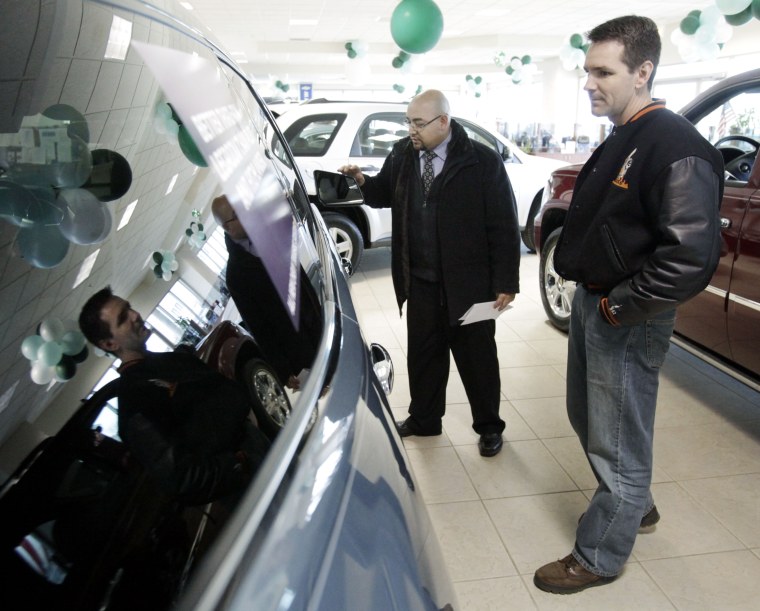Auto leasing, temporarily crippled by the credit and financial crisis, is making a comeback this fall.
Chrysler, Ford and General Motors all curtailed leasing operations last year when credit markets locked up and soaring gasoline prices left them facing losses on the used SUVs and other gas-guzzlers that their financing arms sell when leases expire.
Business isn't nearly back to where it was before the crunch hit, when leases comprised about 20 percent of all car transactions. But it is trending upward after hitting a high for the year of 12.8 percent in October, up from a bottom of 7.2 percent in August, according to automotive information site Edmunds.com.
The turnaround reflects both the slowly strengthening economy and a change in strategy by U.S. carmakers, whose sales suffered from the absence or limited availability of leasing.
"The Big Three have quietly restarted their leasing programs, even expanding them to include smaller or mid-size vehicles to encourage people back into cars," says Mark Guarino, an auto analyst for Chicago-based market research company Mintel International.
All three have now revived their leasing programs through those finance units, and are able to lease cars at more affordable prices in an improved credit market and still make money. International automakers such as Honda and Toyota, meanwhile, have remained in the leasing market throughout.
Consumers still face a more challenging lease market, however.
Q: Does leasing make any more, or less, sense financially than it did before the crisis?
A: Finding an attractive deal is tougher now, and you'll need good credit to get one at all. Beyond that, the discounts and other incentives long used to make leases more appealing aren't nearly as plentiful.
Otherwise, the pros and cons remain about the same as before.
Leasing can give you lower monthly payments than if you purchased the same car. Or for a similar monthly payment, you can drive a much better vehicle. Problems with the car you leased? The manufacturer's three-year new car warranty should protect you. For that reason, it's advisable to have a lease term of no more than three years.
But it really only makes financial sense to lease if you change cars frequently and can take a tax break for driving for business purposes.
Monthly payments don't stop when you lease. If you buy, on the other hand, you could enjoy years of no payments once a five-year car loan is paid off. And you will own a vehicle that may be worth $15,000 or more.
The question to ask yourself is how much value you place on having only new automobiles.
"If it's important for you to always drive new cars, leasing is a way for you to make that more affordable," says Philip Reed, senior consumer advice editor for Edmunds.com.
Q: What can I do to improve my chances of finding a good leasing deal?
A: First of all, watch closely for better price offers as the comeback continues and carmakers try to recoup business now that the sales surge from the Cash for Clunkers rebate program is over.
"You're going to see the manufacturers be more aggressive as the year closes," says chief executive Sergio Stiberman of LeaseTrader.com, an online service for swapping car leases. "So be open for things."
A list of incentives and rebates by region is available at Edmunds.com. If you have decided you want a lease, review what's available, look at the terms to make sure it's active in your area and verify with the dealership's financial arm that you qualify.
Also, check your credit report in advance. There may be problems that could cost you a good lease and can be fixed easily. For example, perhaps you moved and a bill went to your old address that you weren't able to pay on time.
If you're not pursuing a specific incentive, try contacting four or five dealerships in your area for quotes. Tell them what vehicle you want to drive, how many miles a year you intend to drive it and how long a lease you want.
Reed suggests taking the lowest quote you get and calling one of the other dealers to say "If you beat this price, you've got my business."
Check the information site LeaseCompare.com for more information.
You may also want to consider taking over someone else's lease. Check what's available at LeaseTrader.com or Swapalease.com, popular sites that act as matchmakers between buyers and sellers.
Q: If I lease a car, how does insurance coverage work?
A: You are required to obtain insurance on your own, with specified minimum limits. Most leasing companies require at least 100/300 for covering bodily injury — $100,000 per person, $300,000 total coverage.
It will likely be more expensive than insuring a car you own. Since you'll always be driving a new or nearly new vehicle when you lease, you won't have the option of reducing your rate as it ages.
You may also have to get gap insurance, which covers the difference between what your auto insurer pays if your car is stolen or totaled, and the full amount you owe the finance company.
Check to see if the contract you're signing includes gap insurance. If there's an option to buy it you should, Reed advises. Ask the finance manager at the dealership.
